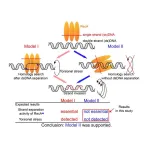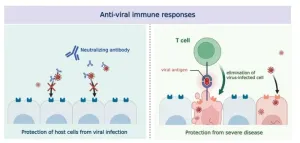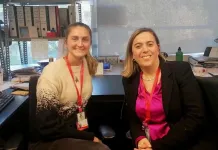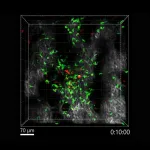(Press-News.org) A recent multicentre study led by Amsterdam UMC and conducted in nine Dutch Intensive Care Units (ICUs) has shown that tailoring a computerised decision support system (CDSS) to the ICU environment significantly reduced the number of high-risk drug combinations administered to ICU patients. It also improved monitoring ICU patients when avoiding such combinations was not possible, and reduced the length of patients’ stay in the ICU. This study is published today in The Lancet.
"Not more, but fewer and more relevant alerts by a CDSS make such a system more valuable for healthcare providers and patients," says Amsterdam UMC's Professor of Medical Informatics Ameen Abu-Hanna, the study's principal investigator.
Combining two or more drugs at the same time can lead to either an increased effect or a reduced effect of the involved drugs. This may result in serious harm for patients. Drug combinations are more common in the ICU because ICU patients are seriously ill and, often, treated with many drugs at the same time.
Fewer, but more impactful alerts
CDSSs are used to alert ICU physicians about potentially risky drug combinations. These systems warn the physicians through alerts during drug prescribing. However, these systems are not properly tailored to the ICU environment, leading to an abundance of alerts that are not clinically relevant, which causes alert fatigue. Research shows that more than 80% of alerts for potentially risky drug combinations are dismissed by ICU physicians, including the important ones. This significantly diminishes the value of CDSS in daily clinical practice, and compromises patient safety.
"Patients in the ICU are critically ill and are often treated with concomitant drugs. At the same time, ICU patients are extensively and continuously monitored. Therefore, it is important to tailor the CDSS to the ICU environment to prevent alert fatigue and improve patient safety in the ICU," says Assistant Professor and co-author, Joanna Klopotowska.
Shorter stay in the ICU
Contrary to the current indiscriminate CDSSs, nine ICUs received during some period a CDSS that was carefully tailored to the ICU environment. This tailored system only showed alerts for drug combinations that were considered high-risk or needing extra monitoring, as defined by a national panel of ICU physicians and hospital pharmacists. The alerts for low-risk drug combinations were turned off. As a result of this adjustment, 12% fewer high-risk drug combinations were administered in the ICU patients, and the monitoring of possible side-effects pertaining to high-risk drug combinations was improved. Patients' stay in the ICU was also shortened.
This study shows that tailoring a CDSS to the ICU environment improves patient safety in the ICU patients. By alerting only where it matters, the ICU physicians were able to better recognize the dangerous drug combinations. This approach can also be valuable for other groups of patients such as neonatology, paediatrics and oncology. At the moment, many hospitals use CDSSs without customization to their specific patient groups, and the systems’ effectiveness is seldom scrutinised.
"We hope that our study inspires and stimulates hospitals to take a more critical look at all the alerts that healthcare providers receive through such systems. This will benefit patients and healthcare providers," says Klopotowska.
Low-Hanging Fruit
Even the ICU departments that did not participate in the study can easily adapt their CDSS today and make it more effective. These adjustments can be made manually in the existing systems and require minimal effort. To this end, the researchers have published two lists. A list of drug combinations that are high-risk in the ICU, for which alerts should be enabled, and a list of low-risk drug combinations that do not require alerts.
"Adapting ICU CDSSs is a low-hanging fruit that all ICUs in the Netherlands and beyond can benefit from, they do not have to reinvent the wheel for themselves." adds Tinka Bakker, at the time of the study the PhD candidate and co-author of the study. On the 7th of December 2023, she defended her thesis at the University of Amsterdam about tailoring the CDSS to the ICU environment.
Together with Joanna Klopotowska and the National Intensive Care Evaluation researchers professor Nicolette de Keizer and Dave Dongelmans, professor Abu-Hanna received funding from ZonMW for this study.
END
A computerized decision support system significantly reduces high-risk drug combinations in Intensive Care patients
2024-01-21
ELSE PRESS RELEASES FROM THIS DATE:
Scientists unravel key steps in the road to DNA repair
2024-01-20
Tokyo, Japan – Researchers from Tokyo Metropolitan University have been studying DNA repair by homologous recombination, where the RecA protein repairs breaks in double-stranded DNA by incorporating a dangling single-strand end into intact double strands, and repairing the break based on the undamaged sequence. They discovered that RecA finds where to put the single strand into the double helix without unwinding it by even a single turn. Their findings promise new directions in cancer research.
Homologous recombination (HR) is a ubiquitous biochemical process shared across all living things, including animals, plants, fungi, and bacteria. As we go about our daily ...
Study identifies new PD-1 immune checkpoint mechanism promoting merkel cell carcinoma growth
2024-01-19
Programmed cell death 1 (PD-1) is an important target for immune checkpoint inhibitor therapies that block its signaling and boost T-cell activity. PD-1 inhibitors have been approved for treating various types of cancer.
But PD-1 functions can vary between different cell and cancer types, either promoting or suppressing disease progression. Merkel cell carcinoma (MCC), a rare and aggressive form of skin cancer, responds well to immune checkpoint inhibitor therapy. However, it was previously unknown if MCC cells express PD-1 themselves, and unclear how exactly cancer cell-intrinsic ...
Vanderbilt chemist Ben Brown awarded $2.375M to develop nonaddictive painkillers with AI
2024-01-19
When Ben Brown, research assistant professor of chemistry, thinks about the opioid epidemic, he views the problem on a molecular level. Painkillers used legitimately in medicine, such as oxycodone, are highly addictive, but better understanding of how their molecules interact with proteins in the body could lead to the formulation of nonaddictive alternatives, he said.
In May, the National Institute on Drug Abuse awarded Brown $1.5 million over five years to further his work in this area. Brown, faculty affiliate of the Vanderbilt Center for Addiction Research and the Center for Applied Artificial Intelligence in Protein Dynamics, is developing artificial intelligence that ...
National champion tree program finds new home
2024-01-19
The National Champion Tree Program started 83 years ago at American Forests to discover the largest, living trees in the United States. Now, the program is moving from the organization’s headquarters to a new home in the School of Natural Resources at the University of Tennessee Institute of Agriculture (UTIA).
American Forests launched the Champion Tree Program in 1940. Its vision included establishing a nationwide laboratory for the study of forestry and trees. Being housed at Tennessee’s 1862 public land-grant university will advance the program’s understanding of big trees. “The National Champion Tree Program moving to UTIA means it can continue protecting ...
New AEM study evaluates potential disparities in restraint use in the emergency department at a minority-serving safety-net hospital
2024-01-19
Des Plaines, IL — A new study that contributes additional data to a growing body of evidence demonstrating disparities in restraint use in the emergency department (ED) has been published in the January issue of Academic Emergency Medicine (AEM), the peer-reviewed journal of the Society for Academic Emergency Medicine (SAEM). The study, titled Disparities in use of physical restraints at an urban, minority-serving hospital emergency department evaluates the association between race/ethnicity and the use of restraints in an ED population ...
CRISPR off-switches: A path towards safer genome engineering?
2024-01-19
Using CRISPR, an immune system bacteria use to protect themselves from viruses, scientists have harnessed the power to edit genetic information within cells. In fact, the first CRISPR-based therapeutic was recently approved by the FDA to treat sickle cell disease in December 2023. That therapy is based on a highly studied system known as the CRISPR-Cas9 genetic scissor.
However, a newer and unique platform with the potential to make large-sized DNA removals, called Type I CRISPR or CRISPR-Cas3, waits in the wings for potential therapeutic use.
A new study from Yan Zhang, ...
Evolution of the human immune system in the post-Omicron era
2024-01-19
It has been 4 years since the start of the COVID-19 pandemic. SARS-CoV-2 has yet to be eradicated and new variants are continuously emerging. Despite the extensive immunization programs, breakthrough infections (infection after vaccination) by new variants are common. New research suggests that human immune responses are also changing in order to combat the never-ending emergence of new SARS-CoV-2 variants. Specifically, it has been discovered the immune system that encountered breakthrough infection by the Omicron variant acquires enhanced immunity against future versions of the Omicron.
A team of South Korean scientists ...
First therapeutic target for preserving heart function in patients with pulmonary hypertension
2024-01-19
A team led by Dr. Guadalupe Sabio at the Centro Nacional de Investigaciones Cardiovasculares (CNIC) in Madrid has discovered a possible therapeutic target for pulmonary hypertension.
The study, published in the journal Science Advances, identifies the first therapeutic target that can be modulated to preserve cardiac function in pulmonary hypertension, providing hope in the fight against this rare but fatal disease for which there is currently no cure.
Pulmonary hypertension is a condition of elevated blood pressure in the arteries that carry deoxygenated blood to the lungs. This increased pulmonary blood pressure puts the heart under continuous strain ...
Endless biotechnological innovation requires a creative approach
2024-01-19
Scientists working on biological design should focus on the idiosyncrasies of biological systems over optimisation, according to new research.
In a study, published today in Science Advances, researchers from the Universities of Bristol and Ghent have shown how exploring the unknown may be the crucial step needed to realise the continual innovation needed for the biotechnologies of the future.
Recognising the role of open-endedness in achieving this goal and its growing importance in fields like computer science and evolutionary biology, the team mapped out how open-endedness is linked to bioengineering practice today and what would be required to achieve it in ...
The secret life of CD4+ T cells: from helpers to melanoma fighters
2024-01-19
In the study led by the Peter Doherty Institute for Infection and Immunity (Doherty Institute) and published in Science Immunology, the researchers found that CD4+ T cells, traditionally called ‘helper T cells’ for their role in aiding the activation of other immune cells, are remarkably effective in controlling melanoma.
University of Melbourne’s Dr Emma Bawden, Postdoctoral Researcher at the Doherty Institute and lead author of the study, said this discovery challenges the conventional understanding of the role of CD4+ T cells in cancer immunity.
“Our ...






